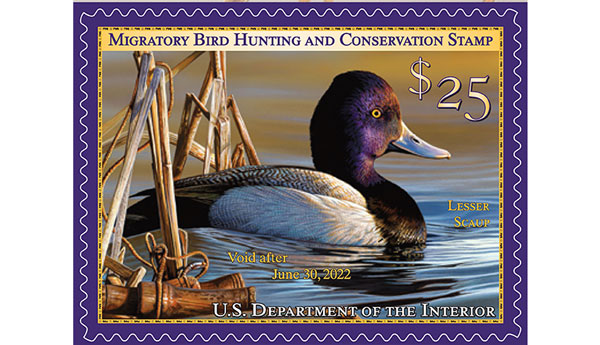
The U.S. Fish and Wildlife Service has published final regulations governing the annual Federal Migratory Bird Hunting and Conservation Stamp Contest–also known as the Federal Duck Stamp Contest–beginning with the 2022 contest. These revisions provide artists more flexibility when designing their art and broaden the appeal of the Duck Stamp to a more diverse audience.
“The waterfowl hunting community is immensely supportive of the Federal Duck Stamp, one of our nation’s most well-known and revered wildlife conservation programs,” said Service Principal Deputy Director Martha Williams. “For nearly a century, Duck Stamps have generated more than $1.1 billion in sales used to acquire 6 million acres of wetland habitats that help address the impacts of climate change, purify water supplies and provide economic support to local communities as they attract outdoor recreationists from many different backgrounds.”
This final rule removes the “celebrating our waterfowl hunting heritage” theme and the mandatory inclusion of an appropriate hunting element beginning with the 2022 Federal Duck Stamp Contest; changes the judging requirements to consider that the entries reflect this theme; and revises the qualifications for selection as a judge. Since the implementation of the 2020 final regulations, which made the hunting theme a permanent requirement, many stakeholders and artists have continued to express their dissatisfaction with this element being mandatory for all entries.
Funds generated from Duck Stamp sales are used to protect waterfowl and wetland habitat in the National Wildlife Refuge System. Numerous other birds, mammals, fish, reptiles, and amphibians benefit from habitat protected by the Duck Stamp revenues, including an estimated one-third of the nation’s endangered and threatened species. The healthy wetlands protected by Duck Stamp funding sequester carbon and contribute to addressing the impacts of climate change, including absorbing flood waters and storm surge.
Waterfowl hunters have been the greatest contributors to the program, as they are required to purchase Duck Stamps to hunt waterfowl. Many collectors, birders and other non-hunters also purchase Duck Stamps to contribute to conservation or for the stamp’s artistic value.
The regulation still requires the live portrayal of one of the eligible species as the dominant feature. Hunting accessories and scenes, such as dogs, decoys and blinds will be optional components and their inclusion will be left to the artist’s discretion.
The 2020 regulations are still in effect for the 2021 Federal Duck Stamp Contest. Entries must include one of the five eligible species and waterfowl hunting theme or accessory. The 2021 Federal Duck Stamp Art Contest will be livestreamed on September 24 and 25 beginning at 10 a.m. each day.
To view a copy of the final rule and public comments, please visit Docket Number: FWS-HQ-MB-2021-0048 at regulations.gov.
For more information on the Federal Duck Stamp Program, please visit: fws.gov/birds/get-involved/duck-stamp.php.
A humble homesteader based in an undisclosed location, Lars Drecker splits his time between tending his little slice of self-sustaining heaven, and bothering his neighbors to do his work for him. This is mainly the fault of a debilitating predilection for fishing, hunting, camping and all other things outdoors. When not engaged in any of the above activities, you can normally find him broken down on the side of the road, in some piece of junk he just “fixed-up.”
